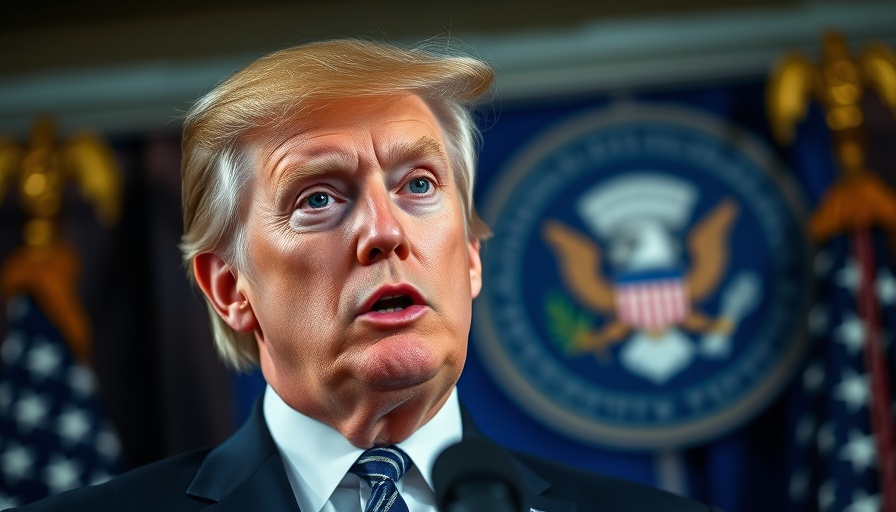
Trump's Address: A Turning Point for U.S.-Iran Relations
In light of the recent events regarding the U.S. military strikes on nuclear sites in Iran, former President Donald Trump delivered a national address that commands attention. This situation marks a significant moment in the ongoing tension between the U.S. and Iran, reminiscent of the complex and often fraught history shared between the two nations. As Trump recapitulated his administration's stance and actions concerning Iran, it serves as a crucial point for understanding how past decisions have led to the current geopolitical climate.
In 'LIVE: Trump addresses the nation after US strikes nuclear sites in Iran', the discussion dives into U.S.-Iran relations, exploring key insights that sparked deeper analysis on our end.
The Historical Context of U.S.-Iran Relations
To appreciate the nuance of Trump's address, it's important to look back at the historical context surrounding U.S.-Iran relations. The 1979 Iranian Revolution marked a pivotal shift that led to decades of suspicion and confrontation. The U.S. has oscillated between attempts at diplomacy and military interventions. The issues surrounding Iran's nuclear program have been particularly contentious, with various U.S. administrations adopting differing approaches, from negotiations to sanctions and military actions.
Key Insights from Trump's Speech
Trump's speech was noteworthy not just for its content but for the emotional weight it carried. He emphasized America’s commitment to national security and the necessity of action against perceived threats, aligning with his previous rhetoric concerning Iran. Speaking directly to the American public, he showcased a mixture of confidence and alarm regarding the threats posed by Iran’s nuclear ambitions, suggesting a sense of urgency that resonated with many listeners.
Public Reactions: Divided Opinions
The former president’s address elicited a spectrum of responses from the public. While some praised the proactive stance on national security and foreign policy, others voiced concerns regarding the potential consequences of military action. In Pennsylvania, residents have echoed these sentiments, discussing the balance between safeguarding national interests and avoiding entanglement in another conflict. The state’s historical ties to military and foreign policy decisions add depth to local perspectives on such national issues.
The Social Connection: Why This Matters
For Pennsylvanians, Trump's comments touched on local values, such as patriotism and community. The implications of international diplomacy have tangible effects, often filtering down to economic factors like job security in industries tied to defense and energy. In a state where many residents have family members serving in the military, the prospect of conflict resonates on a very personal level. Understanding the broader implications of Trump’s address transcends politics—it taps into the emotional fabric of the community.
Future Predictions: What’s Next for U.S.-Iran Relations?
Looking ahead, several possible scenarios could unfold following Trump's declaration. Some analysts suggest that increased military presence may provoke further retaliation from Iran, while others advocate for renewed diplomatic efforts aimed at de-escalation. As tensions continue to simmer, Pennsylvanians will want to stay informed, as the outcomes may affect local business, military recruitment, and community security measures.
Decisions Pennsylvanians Can Make with This Information
In the wake of Trump's address, it is essential for residents to be proactive about their engagement with civic matters. Understanding the global landscape empowers citizens to make informed decisions, such as advocating for responsible foreign policy, voting in local and national elections, and participating in community discussions about military involvement abroad. Increased awareness can lead to informed advocacy and engagement with elected representatives.
Vigilance and Community: The Role of Local Advocacy
Your voice matters. Engaging in local advocacy can foster community strength. Local organizations in Pennsylvania often host forums to discuss foreign policy and military initiatives, providing spaces to voice concerns and suggestions. These forums can also educate residents about how local and national policies intersect, emphasizing the importance of active participation in these discussions.
Conclusion: The Importance of Being Informed
As another chapter unfolds in the complex narrative of U.S.-Iran relations, the duty lies with each of us to remain informed and engaged. Stay connected with local news resources to navigate these developments as they happen. Collectively, we can shape the trajectory of our state's discourse on national security and foreign policy, ensuring that the voices of Pennsylvania residents are heard in the broader conversation.
 Add Row
Add Row  Add
Add 




 Add Row
Add Row  Add
Add 

Write A Comment